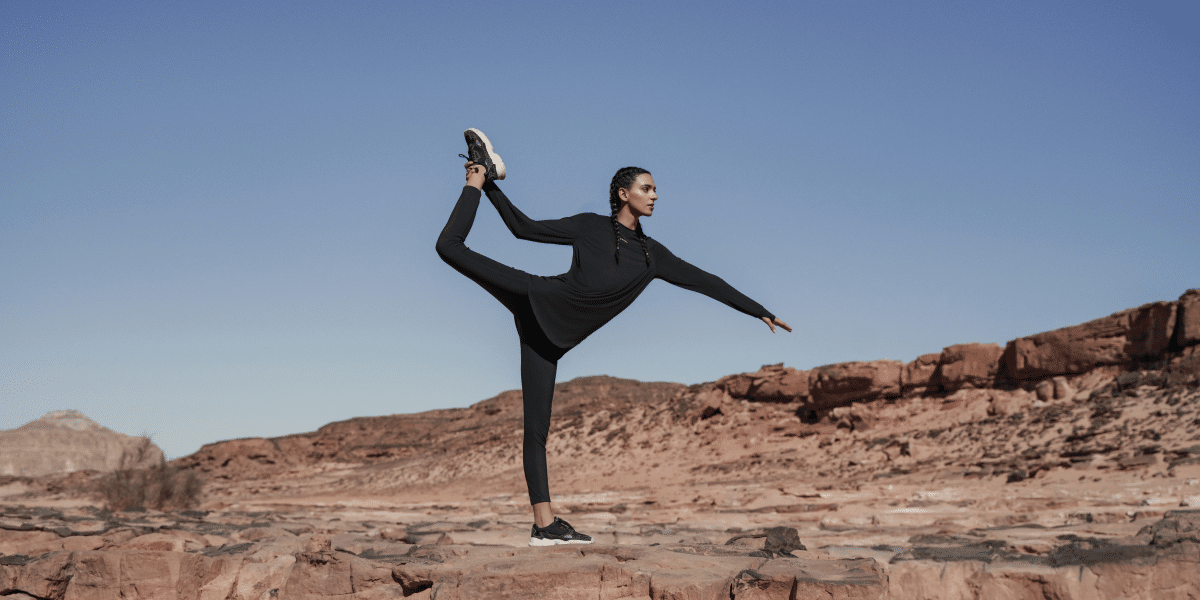By: Crowdcreate
Activewear often prioritizes either style or functionality. QYNDA, which stands for “Quality You Need, Design You Admire,” introduced a revolutionary approach, giving athletes the freedom to choose modest yet high-performance gear to suit their needs.
By offering a distinctive line of activewear that merges elegance with practicality, QYNDA advocates for the autonomy to uphold personal values without compromising on athletic performance or style.
Empowering Choice
QYNDA, founded by Abdulaziz AlNajem, stands at the forefront of a movement that champions inclusivity in athletic wear. Recognizing the scarcity of suitable options for modest athletes, AlNajem set out to create a brand that not only meets this need but also celebrates it.
“Our mission is to empower athletes to embrace their values while excelling in their sports,” AlNajem shared. “QYNDA is about providing choices that resonate with individual preferences and cultural values.”
Inclusive Design
QYNDA’s commitment to inclusivity is evident in its designs, which cater to a diverse audience. From athletes seeking additional coverage for comfort or sun protection to those who prefer a modest style for cultural or personal reasons, QYNDA’s offerings ensure everyone finds something that fits their needs. This approach promotes a refreshing sense of belonging and respect for individual choices in the sports community.
“Understanding the diverse motivations for choosing modest activewear helps us create designs that are both functional and stylish,” AlNajem explained. “We aim to cater to a wide range of needs and preferences, ensuring our products are accessible to all.”
Innovation at the Core
Innovation is at the heart of QYNDA’s product development. The brand’s latest line features advanced materials designed to enhance performance without sacrificing modesty, like the “brrr” Cooling Fabric, tested rigorously in Kuwait’s extreme heat. The material was found to lower temperatures by up to 3 degrees Fahrenheit. This innovative fabric, combined with strategically-placed mesh for optimal airflow, exemplifies QYNDA’s dedication to comfort and functionality.
“QYNDA continuously pushes the boundaries of what’s possible in modest activewear,” AlNajem said. “Our use of advanced materials ensures that athletes can perform at their best, regardless of climate conditions.”
Community and Feedback
QYNDA’s emphasis on community feedback plays a crucial role in its design process. By listening to the needs and preferences of its customers, QYNDA ensures its products remain relevant and effective. The brand is staying ahead in a growing market due to its commitment to serving its community.
“We value the feedback from our community,” AlNajem said. “It guides our design choices and helps us stay aligned with the needs of those who rely on our products.”
A Commitment to Modesty
QYNDA’s ethos is encapsulated in its taglines, “Shape Your Limits” and “Beauty in Modesty.” These principles guide every aspect of the brand’s operations, from design to production. QYNDA offers modest activewear while advocating for a choice that respects individual values and enhances athletic performance.
“Our taglines are the foundation of every design and decision at QYNDA,” AlNajem emphasized. “We are dedicated to redefining the boundaries of modest activewear to welcome all who wish to participate.”
About QYNDA
CEO and Founder of QYNDA, Abdulaziz AlNajem, is a mechanical engineer trained at the University of Portsmouth and further educated in leadership at Cornell University. Recognizing the widespread need for inclusive options, QYNDA caters to individuals from various cultural backgrounds and personal preferences. Whether seeking comfort, sun protection, or simply embracing a modest style, athletes find solace in QYNDA’s offerings. Learn more and shop at https://qynda.com/
Published By: Aize Perez

















